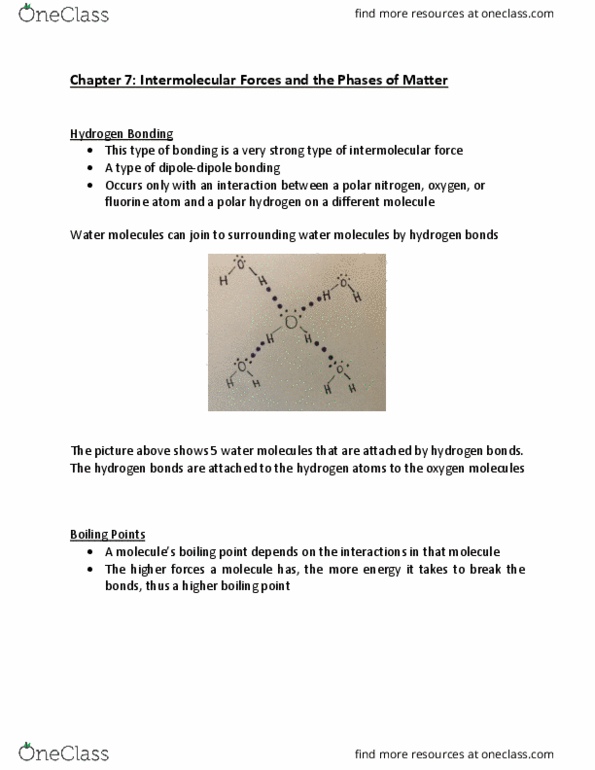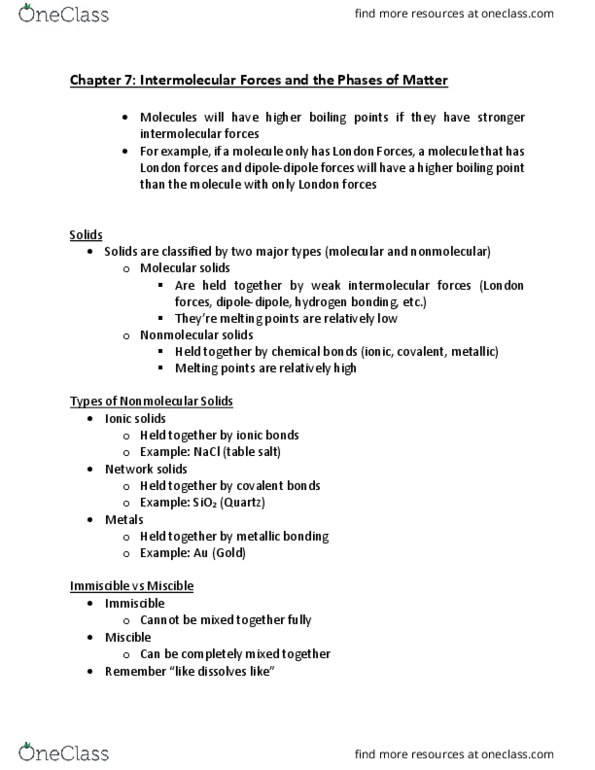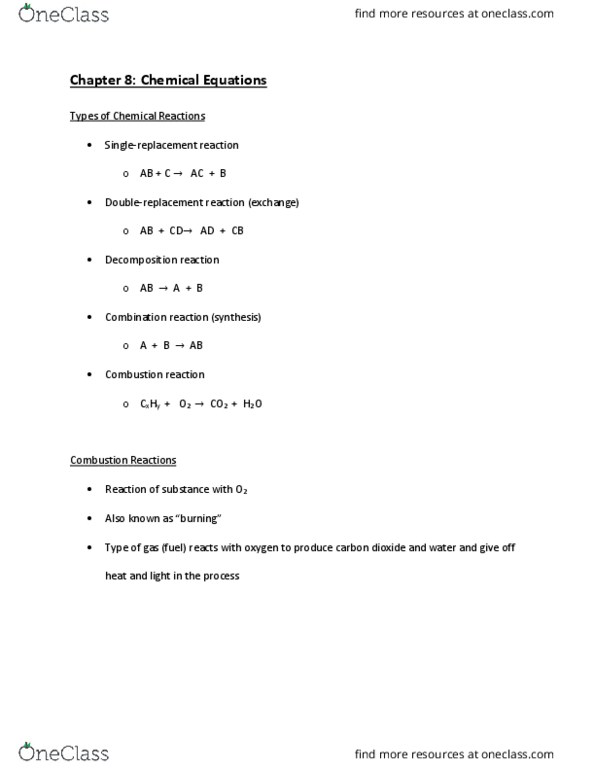Â¥Write a brief (less than 150 words, 3 or 4 sentences) of the aim of the experiment
Â¥Address question of what was done, how it was done, and what compounds were used.
Â¥Include Chemical Reaction where relevant.
See text below. Please provide Purpose following the steps above. Thank you.
Alcohols R-O-H are characterized by the presence of the hydroxyl group
Because of intermolecular co-association, alcohols show higher boiling points
than aldehydes, ethers, or ketones of similar mass. Among alcohols, boiling
points increase with increased surface area. Increased surface area occurs as
more carbons are added to the alkyl portion or with decreased branching of th
alkyl group. Thus, 1-propanol has a higher boiling point than ethanol
(increased C#). 1-propanol also has a higher boiling point than 2-propanol
(decreased branching)
The solubility of alcohols in water decreases as the surface area of the
alkyl (nonpolar) portion increases. Thus, alcohols become less soluble in water
as the number of carbons in the alkyl group increases. When comparing
alcohols that contain the same number of carbons, branching of the alkyl group
decreases its surface area and thus increases the water solubility of the alcohol.
1-Propanol is slightly soluble in water while 2-propanol is quite soluble
The limit of water solubility is reached at about 4 or 5 carbons in the
alkyl group. However, it is possible to "salt out" or separate a water-soluble
alcohol from the water it is mixed with by the addition of certain salts such as
K2CO3. If an alcohol-water mixture is saturated with such a salt, the anion
selectively forms strong ion-dipole bonds to water, leaving the alcohol as a
separate layer. Thus, water is separated from the alcohol because the ionic salt
bonds more strongly with water than with the alcohol. There are twice as many
ion-dipole bonds possible with water than with the alcohol.
Alcohols are relatively acidic organic molecules, being weaker acids than
water, yet stronger than acetylene.
Acidity: water > alcohol > acetylene > ammonia > alkanes
Alcohols may be converted to sodium alkoxides by the action of metallic sodium
under anhydrous conditions. Primary alcohols react more readily tharn
secondary or tertiary alcohols due to the relative stability of the alkoxide ions in
the solvent alcohol.
R-o:-
Alcohols undergo nucleophilic substitution reactions with ease under
acidic conditions. The relative ease of such substitution for primary, secondary
and tertiary alcohols serves as a means of classification. Upon treatment with
concentrated HC1, tertiary alcohols are rapidly converted to alkyl chlorides
Secondary alcohols require warming in a boiling water bath for 15 minutes
Primary alcohols do not react at all under these conditions. The alkyl chlorides
formed by this reaction are insoluble in the concentrated HCl and form an
easily detectable second layer
R-O-H HC1 >
Ð-Ð-Ð
Complications arise from the fact that benzylic and allylic alcohols also
react immediately, but yield products that are soluble in the concentrated HCI
Alcohols are easily oxidized by any of these strong oxidizing agents:
dilute KMnO4, NajCr.07 in acid, or CrO3 (chromic anhydride)
acidified sodium dichromate is somewhat helpful in the classification of
alcohols. Prim
ary and secondary alcohols are oxidized rapidly within several
minutes, while tertiary alcohols do not react under these conditions
Oxidation occurs more easily when the carbon bearing the -OH group
bonded to at least one atom of hydrogen. The complex mechanism of
involves the transfer of a hydride ion H:- as a critical step.
hydrogen atom is absent (as in tertiary alcohols), no oxidation can occur
directly. Tertiary alcohols may be oxidized indirectly through the formation of
alkenes
is also
oxidation
When an appropriate
Alcohols which contain the partial structure C- CH3 give positive
он
results in the iodofora reaction. When the alcohol is dissolved in water and
KOH, the addition of a solution of 12 in KI yields a yellow precipitate of
iodoform, CHI3, along with the oxidized portion of the alcohol
Hypoiodite ion is produced by the reaction between molecular iodine and
hydroxide ion:
I2 + 4(OH) -
The hypoiodite ion in turn oxidizes an alcohol with the proper structure
as follows
он
-CH3-Co I-
H20
Once this oxidation has occurred, additional hypoiodite ion continues to
react with the aldehyde or ketone produced:
CH,-C
3 (0I)-IC-c3 (OH)-
resulting in the final substitution reaction to give iodoform and the anion of a
carboxylic acid containing one carbon atom less than the original alcohol:
128
lodoform precipitates as fine yellow crystals. This precipitate, a result of a
specific oxidation followed by a substitution, is an indication of the partial
structure of the original alcohol.
Simple alcohols of up to ten carbon atoms may be detected by the
ammonium hexanitrocerrata(lV) reagent, (NH4Ce(NO,). The hexanitro-
cerrate(IV) ion has a distinctive orange-red color. When an alcohol, ROH is
added, one or more OR- groups replace the nitro groups as ligands in the
complex ion. The new complex ion formed has a distinctive color. The general
equation for this reaction is:
(OR) n]z-
nNO3_
+
[Ce (NO3%]-2
[Ce (NO3) 6-n
+
nROH
>
This test is positive for aliphatic alcohols up to approximately ten carbons in
length. Phenols or larger alcohols yield insoluble mixtures
Alcohols react with acids or with acid derivatives to form esters. This
characteristic reaction is useful in the formation of specific esters such as ethyl
acetate, acetylsalicylic acid (aspirin) and methyl salicylate (oil of wintergreen). In
this experiment, methyl salicylate will be prepared by reacting methyl alcohol
with salicylic acid in the presence of a trace of sulfuric acid as the catalyst
Lower molecular weight alcohols such as ethanol, methanol, and
isopropyi alcohol absorb water on exposure to moist air or are prepared as
azeotropic mixtures containing water. The presence of water in alcohols may be
detected in several ways. If a small lump of CaC2 is added to any alcohol that
contains a trace of water, a reaction occurs that produces immediate bubbles of
acetylene gas:
Thus, evolution of acetylene gas upon the addition of calcium carbide indicates
the presence of water in the alcohol. Another way to test for the presence of
water in alcohols involves the use of anhydrous cupric sulfate powder (CuSO4)
Anhydrous cupric sulfate is a very pale, almost white powder. In the presence of
water, deep blue crystals of cupric sulfate pentahydrate,
CuSO4-5H20, are formed. Thus, anhydrous cupric sulfate indicates the
presence of water in an alcohol by a simple color change.
Commercial ethanol is produced as an azeotropic mixture that contains
95% ethanol and 5% water. Absolute alcohol contains no water. Many reagent
grade alcohols are composed of a nonpotable mixture of 95% ethanol and 5%
isopropyl alcohol. Thus, absolute ethanol and reagent alcohols are both water
free and give negative results when tested for the presence of water




